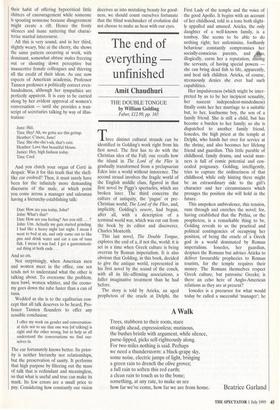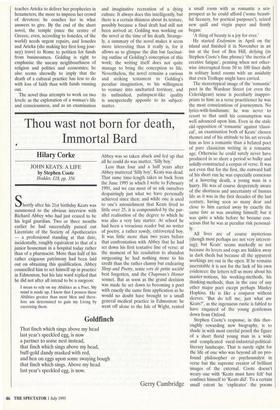The end of everything unfinished
Amit Chaudhuri
THE DOUBLE TONGUE by William Golding Faber, £12.99, pp. 165 Three distinct cultural strands can be identified in Golding's work right from his first novel. The first has to do with the Christian idea of the Fall; one recalls how the island in The Lord of the Flies is gradually transformed from a prelapsarian Eden into a world without innocence. The second strand involves the fragile world of the English middle class, figured in that first novel by Piggy's spectacles, which are broken later. The third concerns the culture of antiquity, the 'pagan' or pre- Christian world; The Lord of the Flies, and, implicitly, Golding's oeuvre, had begun, after all, with a description of a terminal world war, which was cut out from the book by its editor and discoverer, Charles Monteith.
This last novel, The Double Tongue, explores the end of a, if not the, world; it is set in a time when Greek culture is being overrun by Roman imperialism. It is also obvious that Golding, in this book, decided to give the antique world, represented in his first novel by the sound of the conch, with all its life-affirming associations, a fuller imaginative treatment than he had before.
The story is told by Arieka, an aged prophetess of the oracle at Delphi, the First Lady of the temple and the voice of the good Apollo. It begins with an account of her childhood, told in a tone both slight- ly appalled and amused. Arieka, the only daughter of a well-known family, is a tomboy. She seems to be able to do nothing right; her unfeminine, foolhardy behaviour constantly compromises her socially-conscious parents, and Alio, illogically, earns her a reputation, atig the servants, of having special powers she can bring dead fish to life, apparently, and heal sick children. Arieka, of course, strenuously denies she ever had such capabilities.
Her impulsiveness (which might be inter- preted by us to be her incipient sexuality, her nascent independent-mindedness) finally costs her her marriage to a suitable but, to her, loathsome boy, the son of a family friend. She is still a child, but has become a burden to her family; so she is dispatched to another family friend, Ionedes, the high priest at the temple at Delphi, who hands her over for service at the shrine, and also becomes her lifelong friend and guardian. This little parable of childhood, family drama, and social man- ners is full of comic potential and con- cealed poignancy. Golding, intelligently, tries to capture the ordinariness of that childhood, while only hinting there might be an extraordinary side to the girl's character and her circumstances which presages the position she will hold in the future.
This unspoken ambivalence, this tension, runs through and enriches the novel; for, having established that the Pythia, or the prophetess, is a remarkable thing to be, Golding reveals to us the practical and political contingencies of occupying her position, of being the oracle of a Greek god in a world dominated by Roman imperialism. Ionedes, her guardian, despises the Romans but advises Arieka to deliver favourable prophecies to Roman tourists, for the temple requires their money. The Romans themselves respect Greek culture, but patronise Greeks; is there an echo here of Anglo-American relations as they are at present?
Ionedes is a precursor for what would today be called a successful `manager'; he teaches Arieka to deliver her prophecies in hexameters, the more to impress her crowd of devotees; he coaches her in what answers to give. By the end of the short novel, the temple (once the centre of Greece, even, according to Ionedes, of the world) needs urgent repairs, and Ionedes and Arieka (she making her first long jour- ney) travel to Rome to petition for funds from businessmen. Golding is right to emphasise the uneasy neighbourliness of religion and politics and economics; he also seems shrewdly to imply that the death of a cultural practice has less to do with loss of faith than with funds running out.
The novel thus attempts to work on two levels: as the exploration of a woman's life and consciousness, and as an examination and imaginative recreation of a dying culture. It always does this intelligently, but there is a certain thinness about its texture, possibly because a final draft had still not been arrived at; Golding was working on the novel at the time of his death. Strange- ly, a summary of the novel makes it seem more interesting than it really is, for it allows us to glimpse the dim but fascinat- ing outline of Golding's conception of this work; the writing itself does not quite manage to bring the conception to life. Nevertheless, the novel remains a curious and striking testament to Golding's peculiar imagination, to his willingness to venture into uncharted territory, and its unfinished, palimpsest-like quality is unexpectedly apposite to its subject- matter.



































































 Previous page
Previous page